Kirill Sirotkin
Universidad Autónoma de Madrid, Escuela Politécnica Superior, Spain
Pinpoint Counterfactuals: Reducing social bias in foundation models via localized counterfactual generation
Dec 12, 2024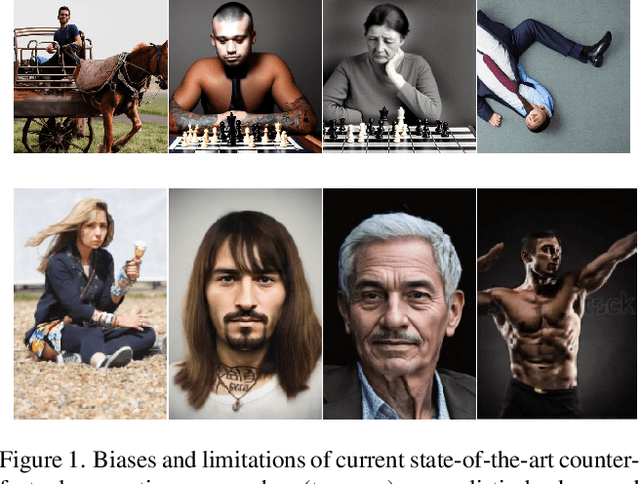
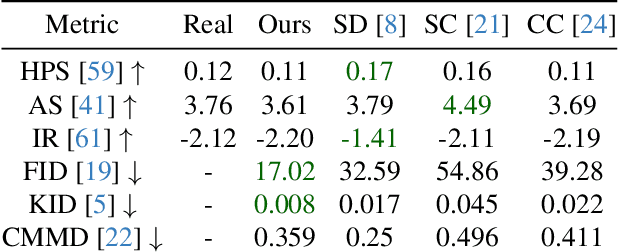
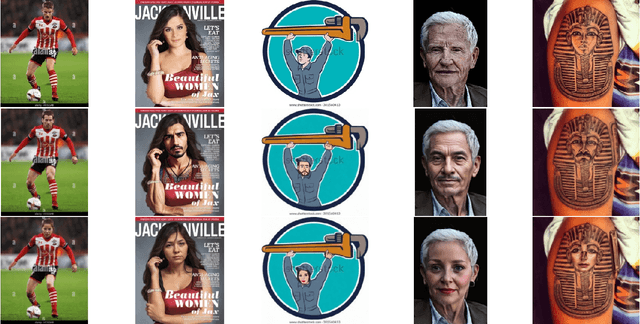

Abstract:Foundation models trained on web-scraped datasets propagate societal biases to downstream tasks. While counterfactual generation enables bias analysis, existing methods introduce artifacts by modifying contextual elements like clothing and background. We present a localized counterfactual generation method that preserves image context by constraining counterfactual modifications to specific attribute-relevant regions through automated masking and guided inpainting. When applied to the Conceptual Captions dataset for creating gender counterfactuals, our method results in higher visual and semantic fidelity than state-of-the-art alternatives, while maintaining the performance of models trained using only real data on non-human-centric tasks. Models fine-tuned with our counterfactuals demonstrate measurable bias reduction across multiple metrics, including a decrease in gender classification disparity and balanced person preference scores, while preserving ImageNet zero-shot performance. The results establish a framework for creating balanced datasets that enable both accurate bias profiling and effective mitigation.
Self-Supervised Curricular Deep Learning for Chest X-Ray Image Classification
Jan 25, 2023



Abstract:Deep learning technologies have already demonstrated a high potential to build diagnosis support systems from medical imaging data, such as Chest X-Ray images. However, the shortage of labeled data in the medical field represents one key obstacle to narrow down the performance gap with respect to applications in other image domains. In this work, we investigate the benefits of a curricular Self-Supervised Learning (SSL) pretraining scheme with respect to fully-supervised training regimes for pneumonia recognition on Chest X-Ray images of Covid-19 patients. We show that curricular SSL pretraining, which leverages unlabeled data, outperforms models trained from scratch, or pretrained on ImageNet, indicating the potential of performance gains by SSL pretraining on massive unlabeled datasets. Finally, we demonstrate that top-performing SSLpretrained models show a higher degree of attention in the lung regions, embodying models that may be more robust to possible external confounding factors in the training datasets, identified by previous works.
A study on the distribution of social biases in self-supervised learning visual models
Mar 03, 2022


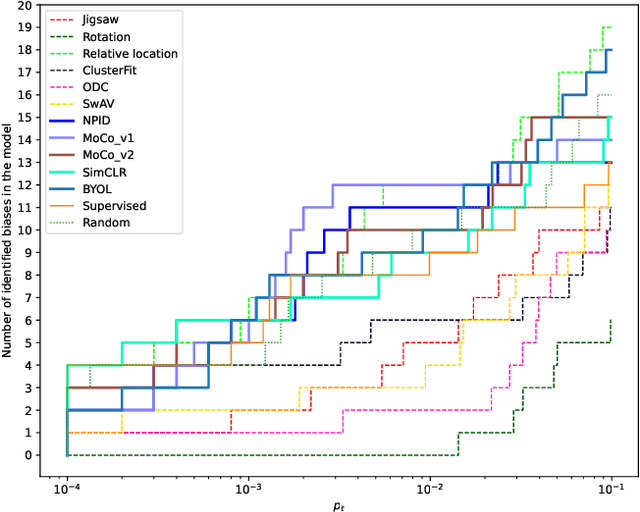
Abstract:Deep neural networks are efficient at learning the data distribution if it is sufficiently sampled. However, they can be strongly biased by non-relevant factors implicitly incorporated in the training data. These include operational biases, such as ineffective or uneven data sampling, but also ethical concerns, as the social biases are implicitly present\textemdash even inadvertently, in the training data or explicitly defined in unfair training schedules. In tasks having impact on human processes, the learning of social biases may produce discriminatory, unethical and untrustworthy consequences. It is often assumed that social biases stem from supervised learning on labelled data, and thus, Self-Supervised Learning (SSL) wrongly appears as an efficient and bias-free solution, as it does not require labelled data. However, it was recently proven that a popular SSL method also incorporates biases. In this paper, we study the biases of a varied set of SSL visual models, trained using ImageNet data, using a method and dataset designed by psychological experts to measure social biases. We show that there is a correlation between the type of the SSL model and the number of biases that it incorporates. Furthermore, the results also suggest that this number does not strictly depend on the model's accuracy and changes throughout the network. Finally, we conclude that a careful SSL model selection process can reduce the number of social biases in the deployed model, whilst keeping high performance.
Improved skin lesion recognition by a Self-Supervised Curricular Deep Learning approach
Dec 22, 2021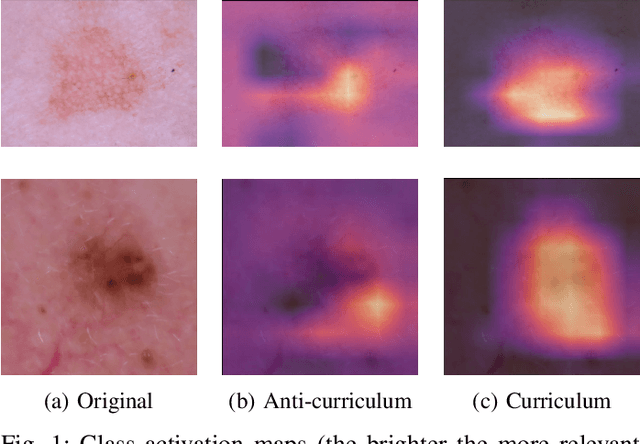
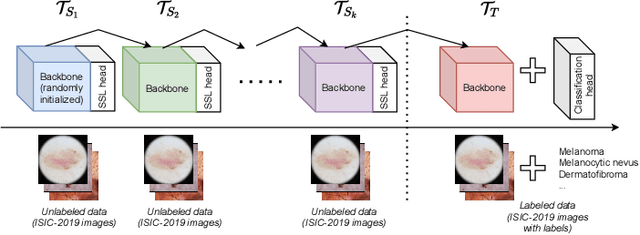
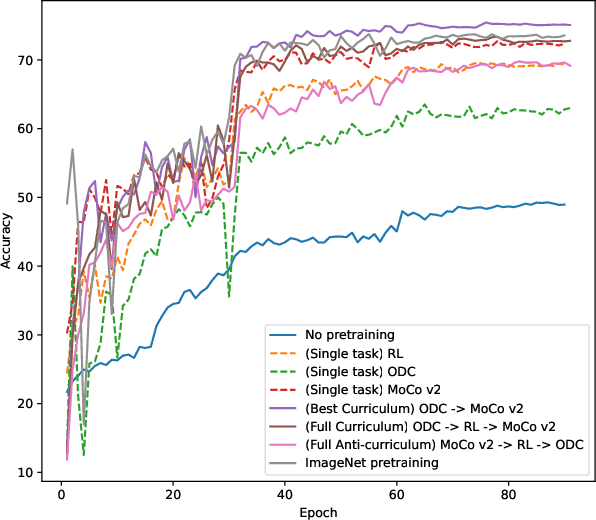
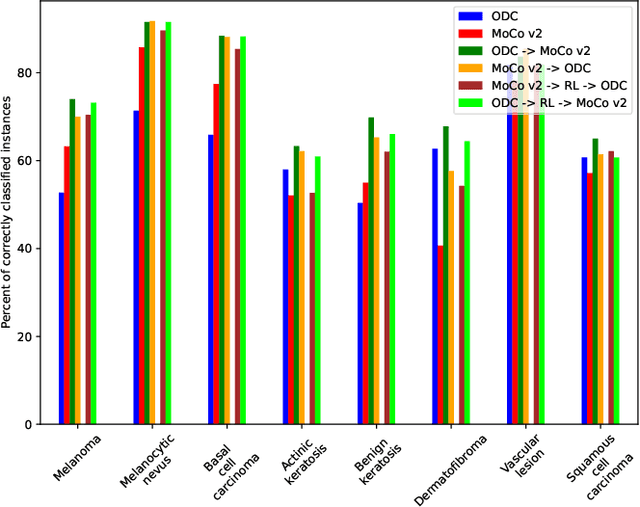
Abstract:State-of-the-art deep learning approaches for skin lesion recognition often require pretraining on larger and more varied datasets, to overcome the generalization limitations derived from the reduced size of the skin lesion imaging datasets. ImageNet is often used as the pretraining dataset, but its transferring potential is hindered by the domain gap between the source dataset and the target dermatoscopic scenario. In this work, we introduce a novel pretraining approach that sequentially trains a series of Self-Supervised Learning pretext tasks and only requires the unlabeled skin lesion imaging data. We present a simple methodology to establish an ordering that defines a pretext task curriculum. For the multi-class skin lesion classification problem, and ISIC-2019 dataset, we provide experimental evidence showing that: i) a model pretrained by a curriculum of pretext tasks outperforms models pretrained by individual pretext tasks, and ii) a model pretrained by the optimal pretext task curriculum outperforms a model pretrained on ImageNet. We demonstrate that this performance gain is related to the fact that the curriculum of pretext tasks better focuses the attention of the final model on the skin lesion. Beyond performance improvement, this strategy allows for a large reduction in the training time with respect to ImageNet pretraining, which is especially advantageous for network architectures tailored for a specific problem.
 Add to Chrome
Add to Chrome Add to Firefox
Add to Firefox Add to Edge
Add to Edge